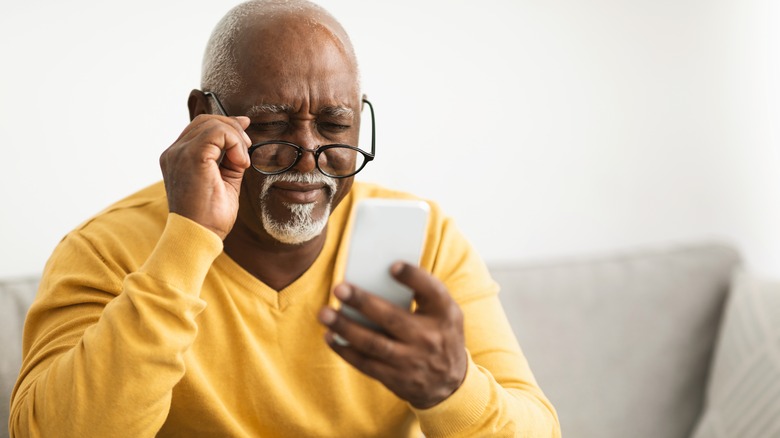An Ophthalmologist's Best Recommendations For Protecting Your Vision As You Age
While going gray is a physical sign of aging, did you know aging can affect other parts of your body? As you age, both structural and brain changes affect other areas of your body like your bones, muscles, memory, digestive system, bladder, and more (via Mayo Clinic). Much like other parts of your body, aging also affects your senses, including your vision. Although it's a completely normal process, some people may start to notice some vision changes. To understand how your vision is affected as you age, we've enlisted the help of Dr. James Kelly, a comprehensive ophthalmologist who specializes in refractive surgery. He is a top Lasik surgeon and the first to implant the EVO lens in NYC.
If you've heard that vision loss may happen as you age, you're correct. Dr. Kelly affirms that "Vision loss increases as people age." Many of the reasons people experience vision loss are due to "cataracts, macular degeneration, diabetic retinopathy, and glaucoma," explains Dr. Kelly. Even though vision loss is a part of the aging process, there are some ways to protect your eyes and vision. In an exclusive interview with Health Digest, Dr. Kelly shares his top three tips for preventing vision loss over time.
Caring for your eyes as you age
One recommendation for protecting your vision as you age is to focus on your diet. More specifically, concentrate on "eating a nutritious diet rich in fruits and dark leafy greens as well foods high in omega 3 fatty acids [since it] is protective," Dr. Kelly tells Health Digest. You'll also want to make sure that you're "maintaining healthy blood sugar levels [as this] is important [too]," points out Dr. Kelly.
You can also protect your eyes by wearing appropriate eyewear for protection against the sun (UV sunglasses), as well as during sports or in hazardous work environments, he explains. Getting a "periodic dilated eye examination" and avoiding smoking can also help.
Even though vision loss is a part of aging, there are times when a doctor should be consulted. Dr. Kelly recommends taking into account how fast vision loss is happening. "In general, the more sudden the vision loss, the more immediate help should be sought," says Dr. Kelly. This is because certain eye-related conditions need to be addressed promptly. He notes conditions such as stroke, trauma, retinal detachment, and infection should be seen right away. Alternatively, "there are conditions which arise more slowly such as dry eye, blepharitis, allergic conjunctivitis, myopia and astigmatism, which require attention on a less emergent basis," he further explains.
If you're interested in learning more about Dr. James Kelly, visit his website, Kelly Vision Center. In addition, you can learn more vision tips by following him on Instagram and Tiktok.


